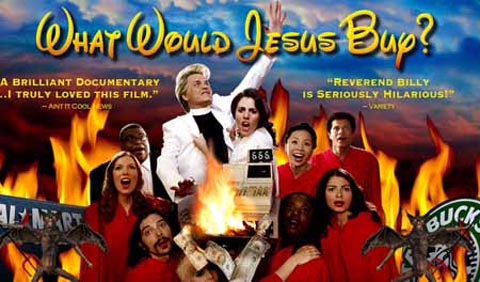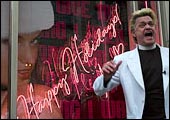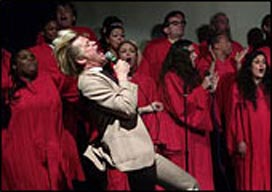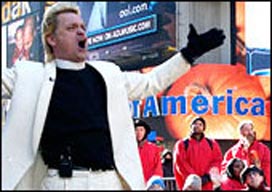Brother Love's Traveling Salvation Show: or, Well, What WOULD Jesus Buy?
13 Mar 2008
"Let’s go shopping!
At the mall!
It’ll be fun, yeah!
––lyrics from Girlfriend2000, Let’s Go Shopping"!, 2005

What Would Jesus Buy?” It’s more than just a clever slogan, it’s more than just a bumper sticker, and it’s more than just a film. Although it is all those things too.
“What Would Jesus Buy” the movie, produced by Morgan Spurlock (whose previous film, “Super Size Me,” was also about the dangers of overconsumption), follows Reverend Billy and his wife and partner Savitri D., and their gospel choir, on a cross-country tour of malls in America (including the Mall of America), concluding with a spectacular piece of guerrilla theater where they infiltrate Disneyland on Christmas Day and stage a Stop Shopping gospel revival in the center plaza.
Maybe you’ve heard of Reverend Billy and the Church of Stop Shopping. Or maybe you haven’t. But the exhortation rings a chord--you do know that you’re buying too much stuff. You feel it. You see it. You know it. But--you can’t seem to stop it. Can your paycheck be saved? Can you?
Reverend Billy, the nom de guerre of artist Bill Talen, is coming to your local shopping plaza with his particular brand of performance to engage the enemy where it lives: within. Fear not! He is coming to save you.
Reverend Billy Gets Religion
Rev. Billy’s incorporation of religious memes into street theater has an interesting conception. Relocating from San Francisco to Times Square in the heart of New York, he was present for its recent makeover and “Disneyfication.” He watched as the heterogeneous and gritty yet diverse street commons was enclosed and paved over with pastel lights, each heralding a new plastic god or goddess from the advertising pantheon, 7 stories high. These jeans. Those sneakers. This animated princess, that scrappy yet adorable anthropomorphic neotonic creature. Buy tickets! Buy the T-shirt! Buy the action figure! Buy, buy, buy! Because only by buying can you hope to be as sleek and tall and beautiful and light as those you see blinking down at you.
The only elements of the former Square to escape enclosure and commodification were the street preachers, still exhorting the passers-by to accept Jesus as their personal savior, and warning that the End was near. Scrabbling around on the margins, no one wanted to turn them into video games and backpacks. So Bill Talen, a long-time performance artist with a history of political activism and a cast of characters, began to study his new role. He would become a preacher, yes--for the Church of Stop Shopping! He would save souls--from thinking they could be saved by consuming! He would herald the coming “Shopocalypse!”

Inside Out
Although having worked in “traditional” avant-garde theater for years (on a stage, with a quiet darkened audience, in a building), Talen had also been doing public “interventions”, and had been becoming less and less satisfied with the traditional theatrical setting. A stage is set apart from the stream of life. You go in, watch the show, perhaps become inspired, and then go back to your real life where you basically behave exactly the same as before. That basic behavior is what street theater aims to interrupt. The surprise and immediacy of encountering guerrilla theater breaks down the invisible fourth wall by confusing the issue--are these people putting on an act, or is it real?
If it’s an act, maybe I’ll stop and watch for a bit, especially if it’s funny. Even though I may be a person who would never go to see an anti-consumerist avant-garde theater production? Especially if I may be a person who would never go to see an anticonsumerist avant-garde theater production!
And if it’s real--maybe they have a point?

Because it is almost not about the objects at all, it is about the process. Shopping is our religion. It is a ritual we perform to connect with something larger than ourselves, to fill the void we sense in our lives. Each of the objects that you buy has two components, its material presence, and its conceptual meaning--you will be happier/better/smarter/more beautiful/finally fulfilled. Your self-conception has been colonized by advertising--you are a consumer. “Consumer”: You have heard that so often it sounds normal. But what does it mean? Are you some kind of unconscious feeding tube, remarkable only for the impression of its vertebrae in the eventual substrate our cities will become? Surely not! So you buy to stave off meaninglessness, to fill the void inside. After all, advertising promises that one more object (and another! and another!) will provide the meaning and connection you seek.
And yet it’s not working. You buy more and more stuff, and you’re still not happy, you’re still not fulfilled. Our shelves and closets and landfills are full, but our spirits are empty. And still we consume and acquire, as if More, and Faster, will fill the void before it empties again. As if quantity and speed will be the oil that keeps the water in the sieve. The system is corrupt, the concept is collapsing under the weight of its own incoherence - and yet it still stands. It is ripe for toppling.
Although the film does a great job of documenting Rev. Billy’s performance/interventions, he and his choir are not switching over to become filmmakers. It is important to do this kind of act/protest/performance in person. The street provides a much larger and more varied audience than can ever be gathered in a darkened room. Embodied theater--to venture out into the physical and social environment, to generate that ineffable yet very real connection with people with your personal presence--is the only way for performers to really reach inside someone else and hope to effect a small, and hopefully later a great, change. The context is key; it must be done in public, and in person. And they sing. Singing is one of the most purely joyful things people can do, and when a group raises its voice in song, others cannot help but vibrate a bit in kind. It is the dream of a performer that the audience would resonate with her. Through song, they do, and a bit of the message gets through that way too.
I’m Going to Make Mincemeat Out of That Mouse!
Why Disney? The film even features section titles using the Disney font. Disney was one of the main culprits in the re-imagineering of Times Square, back in the day. Talen saw that those round mouse ears hid tiny red horns (for sale, only $14.99, comes with child-friendly adhesive backing). Disney and its corporate cohorts have enclosed our imaginations as surely as their collateral has filled our shelves and screens. From manufactured stories to manufactured vacations (Disneyland) to manufactured towns (Celebration), Disney did not call it “imagineering” for nothing: to engineer the imagination. Here, we’ll give you an imaginal world, pre-built. Much better and more impressive than you could do yourself, especially at a tender age.

Rev. Billy says, there is a way out. Stop buying in.
Fighting Fire with Fire
Bill Talen has done more overtly political characters in the past. A notable one was George, a presidential candidate in the early 1990’s, who, with a cast of spin doctors, wife, mistress, and other handlers, hosted fundraising dinners and campaigned in public space. Another more recent performance involved reading the First Amendment, which defends the right to free speech, in Union Square in New York City. Union Square has a rich history of political speechifying and activism, as might be deduced from its name. But that was then, and this is now. Talen was arrested, of course.

And maybe Rev. Billy and his congregation and choir seem tiny when opposed to our entire acquisitional way of life, with big money and big corporations, and big profits. But sometimes that’s all you need. As Nikola Tesla theorized, a small repeated force, applied at the right time in the right place, could break a world apart. And once it does, we see that the enclosure was false, that we are free, that we always were. Change- eluia!
But you have to want to change, not charge! You have to admit you’re a sinner; we are all sinners! You have to want to believe, in something other than what is sold to you! You have to say yes Lord, I am ready! I am ready to be free!
Because Jesus? He’s not buying it. And neither should you.
Peggy Nelson is a painter and writer for Otherzine.
◊